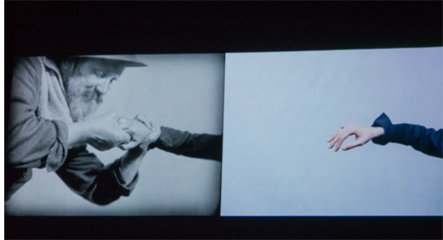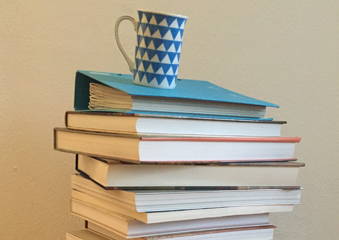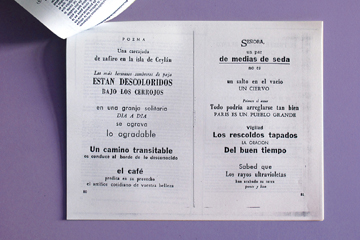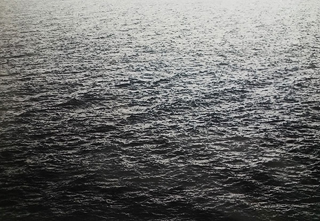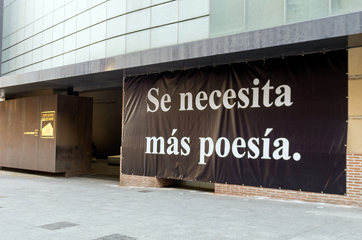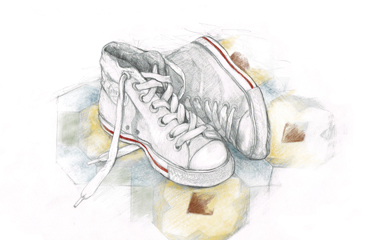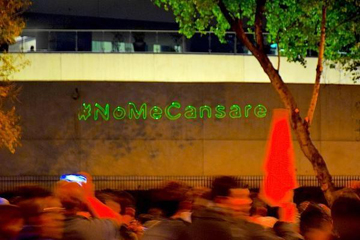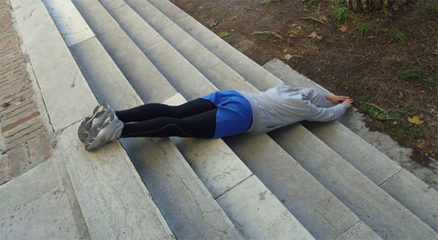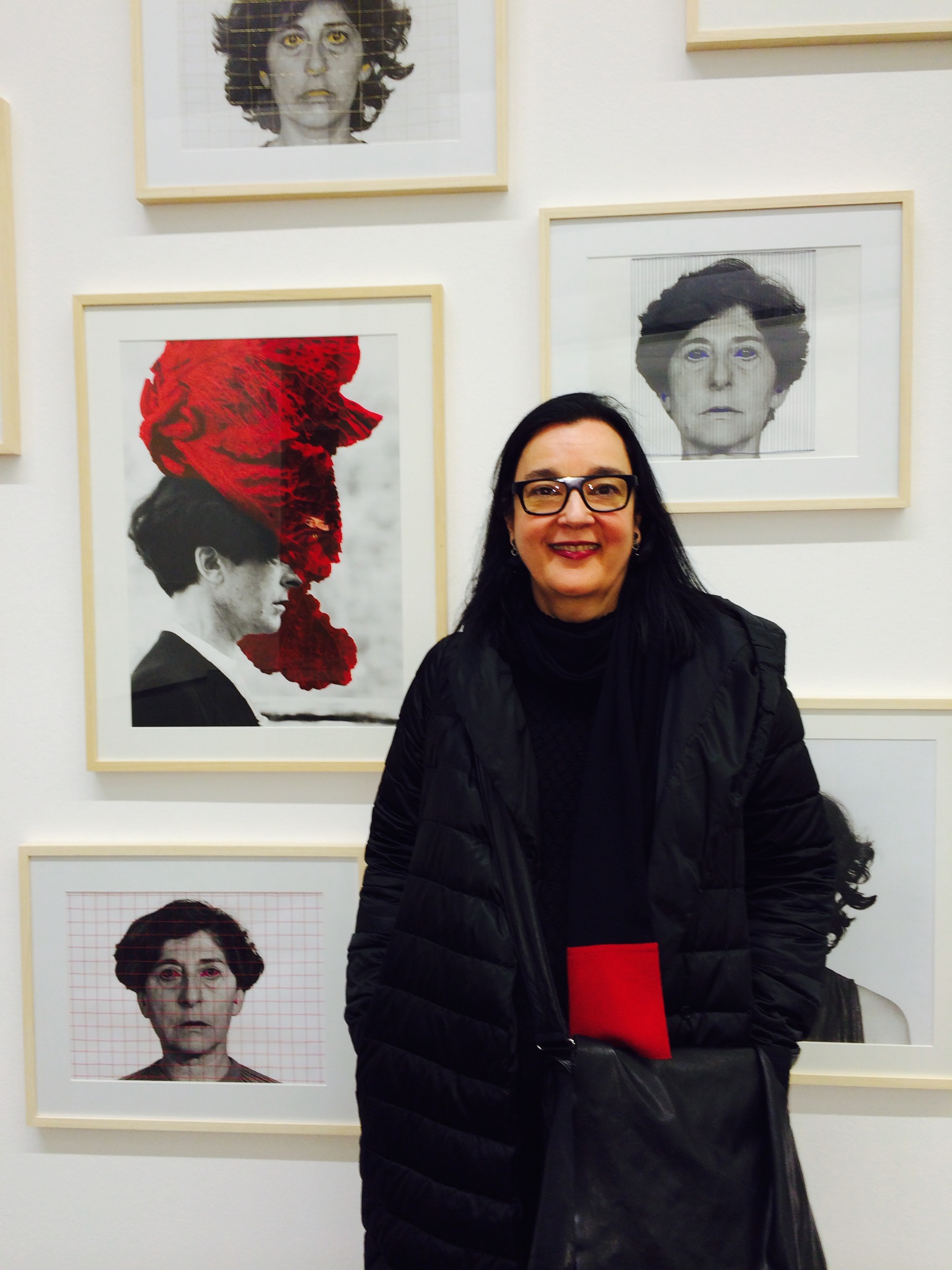Artists in Residence is a joint program by CA2M and La Casa Encendida. Its goal is to support creation by dance artists and other artists working with their body. The program offers artists spaces to experiment, to think and to present their proposals.
Acento is a program linked with a Artists in Residence. Projects carried out during 2013 stays will be resented and a meeting space with 2014 artists will be created. Both institutions want to stress the reflection resulting from artistic production that happens through the body. Body is hereby understood as social body, as a political construction that that transforms sensitivity into knowledge.
Artisits selected in 2013 were: Elisa Arteta, Cristina Blanco, Pablo Esbert, Carmen Fumero, Martín Llavaneras, Cecilia Lisa Eliceche, Elpida Orfanidou and Juan Perno, Ángela Peris, Jesús Rubio Gamo and Navidad Santiago.
Admission free while seats are available.
PROGRAMMING
THU 13 FEB IN LCE
20.30h. Building Ropes, by Carmen Fumero
This is a journey made with sensations. Two people relate with each other using intuition represented by their hands, able to express desire and impulse. Sometimes they feel a spontaneous and intuitive need to follow the same direction; sometimes guiding is their objective, and some others they let themselves go. The hands answer the need to recover that emotion. As a result, a past sensation.
Carmen Fumero has carried out several solo projects, among which a work from 2011, with the support of Laura Kumin and Daniel Abreu stands out. In 2010 she received a residence grant in Teatros del Canal through Madrid Choreographic Contest, and that is when she creates her first big format work, Irony, which opened at Teatro Pradilo in 2011. In 2013 she received two choreographic residences, one in Teatros del Canal and another one in La Casa Encendida.
http://carmenfumero.blogspot.com.es/
21.30h. SuperFicials, by Navidad Santiago
This work is a reflection on matter’s communication capacity, starting from elemental particles until reaching human behavior. Because behind modern science, behind fractures and unions, behind love and unease, behind social change, poetry and fiction, our behavior patterns convey the conduct of the most essential matter, of the most superficial matters.
Navidad Santiago (Madrid, 1975) holds a Sociology degree by the UCM. Madrid; a post-graduate degree in Political History by Palachejo University. Olomouc. Chec Republic, and a degree in Classical Dance by África Guzmán, SCAENA, Madrid Dance Center.
FRI 14 FEB IN CA2M
19.00 h. Elpid’arc, by Elpida Orfanidou and by Juan Perno
Elpida Orfanidou and Juan Perno decide to plunge into an impossible adventure: to copy and recreate one of the most important works of the history of cinema, the silent movie La passion de Jeanne d’Arc (1928) directed by C.Th.Dreyer and featuring María Falconetti as main actress. Elpid’arc is a film-performance where cinema and theatre become an alchemical solution. The unexpected encounter between mysticism, everyday life and sense of humor makes this work fascinating.
Elpida Orfanidou (Greece, 1981) is a Greek choreographer and performer; she studied dance and performance in Athens, Arnhem, Montpellier and London. She has created several solo projects that were gathered in “One is almost never”. She has worked with Herman Heisig (United States) and Juan Perno ( Elpid’arc). As a performer she has worked with Gui garrido, Tim Etchells, Mahela Rostek and Meg Stuart among others.
Juan Perno (Madrid, 1980) holds a degree in Philosophy (UAM Madrid) and a PhD in Aesthetic, Photography and Audiovisual Communication (Fine Arts College. Universidad Politécnica of Valencia). He has been a teacher of real and live cinema and video in several centers. He worked as a creative director of digital advertisement in Italy for four years. At the time he works in projects mainly focused on appropriation in different fields such as video, photography and theatre. Elpid'arc is his last work. It’s a co-production between HAU Theatre Berlin and the Onassis Foundation in Athens, together with La Casa Encendida and CA2M.
http://vimeo.com/elpidaorfanidou
20.30h. Vortex agitator, by Cristina Blanco
Vórtex agitator is Cristina Blanco’s brand new project. Starting with the wish to work with different genres (cinema, opera, theatre, musical, etcetera…) the artist researches on each genre’s conventions in order to question their rules and to surprisingly combine them. A live collage of genres that talk to each other and break their own codes, questioning their own nature and playing at changing the rules. Why do we associate a symphonic orchestra playing dissonant music with a scary movie? What happens if the credits at the end of a James Bond movie have a background of traditional bagpipe Galician music? How do E.T. and a bishop live together in the Far West? What about a Sevillana dancer and a ninja fighter in a spaceship?
After getting a degree in Mime Theatre by RESAD, Cristina Blanco works as an actress in several theatre companies. She gets interested in dance and follows a few workshops, plays different roles in a few short films and sings in a few bands. In 2004 she creates her first solo project: cUADRADO_fLECHA_pERSONA qUE cORRE (square, arrow, person who runs). In 2006, she creates caixa preta_caja negra together with Brazilian choreographer Claudia Müller. In 2008 she opens The Nevestarting Story, a project by Cuqui Jerez, María Jerez, Amaia Urra and Cristina Blanco. In October 2009 she opens The Croquis Reloaded in Madrid, a work by Cuqui Jerez with Cristina Blanco. In September 2010 she features TELETRANSPORTATION installation/piece created for Mapa festival, and in October she opens ciencia_ficción (science-fiction), a solo chat-process-blog-concert.
http://www.tea-tron.com/cristinablanco/blog/
SAT 15 FEB IN LCE
17.30h. Impermanence, by Elisa Arteta
The artist proposes a corporeal, visual and sound experience that refers to constant change and no-return. The artist’s movements are limited in this situation and she needs to adapt her body to a new habitat. When time passes by, a well-defined trail is left behind which becomes the memory of what happened there. Meanwhile the audience can freely walk around the installation and choose the duration of their experience.
Elisa Arteta is a dancer in the broad sense of the term. Her work shows many layers and interests, ranging from video camera use, to proprioception study or the search of ways to integrate different themes on stage. At the moment she questions the intentions of a body that is displayed on stage and the meaning of the concept of choreography itself. She always looks for very different contexts to present her work. http://elisaarteta.com/
18.30h. Sound-sensing the space, by Ángela Peris Alcantud
This work is about inventing a new sound reality. This reality exists and it’s right here, around us. In order for this world to come into light, it needs to be vibrated, told, noted down, whispered, broken down, played and displayed. The idea of sound-sensing results from the need of creating movement through sound. Our own imagination or an external factor (all the sounds around us) could be creating this sound. In both cases and both through the internal and the external sound, sentences are created with the body and the voice that finally become a rhythmic score, a piece of sound and movement. Sound-sensing means to experience sound islands that together make a noisy and invented archipelago.
Ángela Peris Alcantud holds a degree and a master in Audiovisual Communication; she studied choreography and dance in Martha Graham School and Dance Space Center (now DNA), New York; in SNDO, School for New Dance Development, Holland, and in Institut del Teatre, Barcelona. Her work is a quest for a meeting point between movement, voice and thought. Together with artist Alma Söderberg, in 2012 she created ALLES, a piece designed for children. Also, since 2011 she works as a collaborating artist in Yehudi Menuhin Foundation in Spain, as part of the Mus-e program, art for coexistence. http://angelaperis.blogspot.com.es/
20.00h. The rape of Europa (2013 - ad infinitum), by Jesús Rubio Gamo.
Searching for a subjective-collective non-historical memory
Jesús Rubio Gamo aims at creating a meeting point in Madrid city with the goal of building a collective memory that is both subjective and emotional. A "memorial emotional and dramatic monument" would be created to be shared with others through samples of this very monument and additional activities (such as round tables and debates) revolving around this process.
Jesús Rubio Gamo (Madrid, 1982) holds a Master in Performing Arts and Visual Culture by Alcalá de Henares University and Reina Sofía National Museum, 2011-2012. He is a play-wright. Co-author of texts presented by the Sala Cuarta Pared, Madrid, in 2010 "White Night" event; guest choreographer, Spanish representative in Das 6 Tagen Rennen International Festival. Creation of a piece with residence in Pact-Zollverein, Essen. Shows in Madrid, Lucerne and Essen. German-Spanish-Swiss co-production, 2010.
http://www.jesusrubiogamo.com/
21.30h. Going nowhere together, by Pablo Esbert
Going nowhere together is performance that seems to be a concert, a ritual that seems to be a ballet solo, and a collective experience that seems to be a show. During two months I have invited other artists, friends, relatives and strangers to spend a day with me; a day to share physical and sound practice, to reflect and discover together going nowhere.
http://goingnowheretogether.wordpress.com/
Pablo Esbert Lilienfeld creates his own theatre and audiovisual works since 2005. He closely works with Alessandro Sciarroni and with other European choreographers. At the same time, he works as a musician and video-creator. He studied Audiovisual Communcation in Universidad Complutense, Contemporary Dance in RCPD and music in the Creative Music School.
www.pabloesbertlilienfeld.com
La Casa Encendida and CA2M want to stress the reflection resulting from artistic production that happens through the body. Body is hereby understood as social body, as a political construction that that transforms sensitivity into knowledge.
